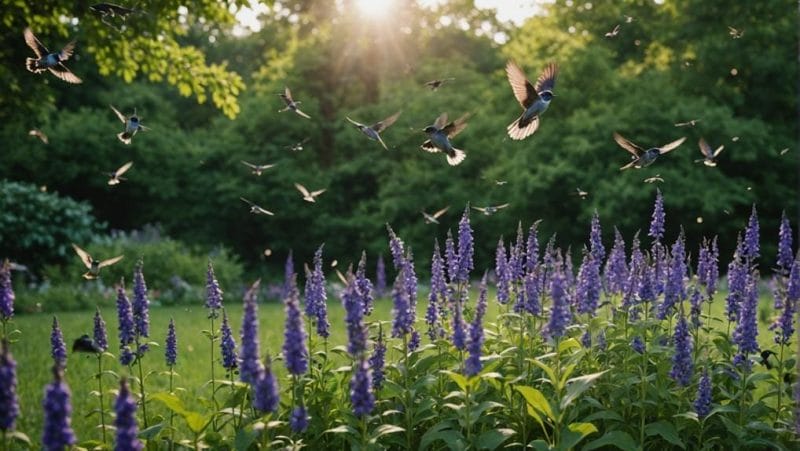How to Attract Birds That Eat Mosquitoes and Bad Garden Bugs

You might be surprised to learn that a single bird can consume hundreds of mosquitoes daily, making them a valuable asset in your backyard’s pest control. By attracting these bug-eating birds, you can enjoy a more comfortable outdoor space while reducing your reliance on chemical insecticides. But how do you entice these feathered friends to visit and stay? It starts with creating a bird-friendly habitat that meets their basic needs – and that’s where you come in. By making a few simple changes to your yard, you can roll out the welcome mat for these mosquito-munching birds and reap the benefits of their presence.
Summary of Key Findings
- Create a bird-friendly habitat with shelter, food, water, and vegetation to attract mosquito-eating birds.
- Offer high-protein food sources like dried mealworms and insect-packed suet cakes to attract birds that consume mosquitoes.
- Provide fresh water sources, like birdbaths or fountains, with shallow water and a branch or stone for birds to access.
- To create a welcoming environment, plant flowers that attract birds, such as petunias, salvia, and nasturtiums.
- Maintain a well-groomed garden with low shrubs, ground cover, and dense greenery to provide bird shelter and protection.
Benefits of Bug-Eating Birds
Bug eating birds are an invaluable asset to your garden because of the multitude of benefits they bring, from instant garden beautification to significant health advantages.
By attracting mosquito eating birds, you’ll witness natural pest control as they devour unwanted insects like mosquitoes, reducing the need for pesticides.
This, in turn, maintains ecological balance and minimizes the risk of disease transmission.
With bug-eating birds in your backyard, you’ll enjoy fewer mosquito populations, reducing the risk of diseases like Zika, dengue, and chikungunya.
These birds eat mosquitoes, helping you maintain a healthy ecosystem and making your garden a haven for you and your family.
Shelter for Mosquito-Eating Birds
Creating a bird-friendly habitat with shelter will increase the chances of attracting mosquito-eating birds to your yard, where they can thrive and provide natural pest control.
Letting hedges and trees grow wild provides ideal bird shelter, as dead tree branches and thick shrubs are perfect nesting spots.
Hanging birdhouses and nesting boxes provide additional shelter, especially in areas with the right sunlight and protection from harsh weather.
Planting low shrubs and ground cover also helps provide birds shelter and protection.
Attracting Birds With Food Sources

Offering diverse food sources, such as dried mealworms, insect-packed suet cakes, and worms, can substantially enhance your yard’s appeal to mosquito-eating birds.
These high-protein food sources will attract birds that naturally consume mosquitoes, like bluebirds.
Insect-packed suet cakes are a great option, as they provide high-energy nutrients that sustain birds while they hunt for mosquitoes and other insects in your yard.
Placing worms near bird feeders will grab their attention, encouraging them to visit and eat mosquitoes.
Consider setting up multiple bird feeders in different areas of your yard, offering a variety of food sources, such as seeds, fruits, and insects.
This will attract a range of bug-eating birds, increasing the likelihood of them eating mosquitoes and other bad garden bugs in your yard.
Creating a Bird-Friendly Yard
You can create a bird-friendly yard that attracts mosquito-eating birds by incorporating a combination of essential elements that cater to their needs, including shelter, food, water, and vegetation. To make your yard bird-friendly, focus on providing shelter with low shrubs and ground and installing birdhouses. Offer fresh water sources, like birdbaths or fountains, with shallow water and a branch or stone for birds to stand on. Keep your garden well-maintained, and consider adding birdseed varieties like sunflower and safflower seeds.
| Element | Description | Tips |
|---|---|---|
| Shelter | Provide hiding spots and nesting areas | Install birdhouses and dead tree branches |
| Food | Offer nutritious food sources | Use bird seed, sunflower seed, and safflower seed |
| Water | Provide fresh water for drinking | Refresh the water regularly and add a branch or stone |
| Vegetation | Plant flowers that attract birds | Include petunias, salvia, and nasturtiums in your garden |
Types of Mosquito-Eating Birds

Among the various bird species that prey on mosquitoes, several types stand out for their voracious appetites and ability to effectively control mosquito populations.
As you aim to attract these birds to your yard, creating an optimal environment is crucial to know which ones are most effective at eating mosquitoes.
The American Robin, a migratory bird, feasts on insects, including mosquitoes.
The Blackpoll Warbler consumes mosquitoes while flying, and the Barn Swallow can eat up to 850 insects daily, including mosquitoes.
The Ruby-Throated Hummingbird and Nighthawks also feed on mosquitoes and other insects.
Maintaining a Bird-Friendly Garden
Creating a welcoming habitat can encourage mosquito-eating birds to visit and stay in your yard, reducing the need for pesticides and insecticides.
To maintain a bird-friendly garden, guarantee you regularly provide fresh water and prune trees. During hot summer months, refresh the water frequently to keep it clean and moving, attracting birds that feed on mosquitoes.
Install birdhouses or create nesting opportunities for security and safety. Space them throughout your garden and yard to provide coverage.
Plant low shrubs and ground cover to protect birds, and add trees and bushes with dense greenery for non-migrating birds. By doing so, you’ll create a bird-friendly environment that attracts various species, helping control mosquito populations naturally.
Conclusion
By following these steps, you’ll be well on attracting birds that eat mosquitoes and bad garden bugs.
Notably, a single bird can consume up to 500 mosquitoes per hour, making them a valuable asset in your pest control arsenal.
By creating a bird-friendly habitat, you’ll enjoy the beauty of nature and reap the benefits of natural pest control. You’ll reduce your reliance on chemical pesticides and foster a healthier ecosystem.
